I’m half Russian. My mother is originally from Nizhny Novgorod. I went there for summer holidays all my childhood until I was 15. After that, as an adult citizen of a foreign country, I no longer had access to the city (then Gorky), which was closed to foreigners.
Since then, I have only been able to meet my grandmother in Moscow. In our family, the Warsaw Pact invasion of Czechoslovakia in the summer of 1968 were never called an ‘occupation’, nor was it called ‘brotherly help’. Instead, the event had been ‘forgotten’ (read blocked out). Russians have the ability to ignore unpleasant truths, especially when every family or friendly get-together begins with a glass of vodka.
My grandfather Leonid Jerlygin fought in World War II. He later received the Order of the Red Star for bravery. To this day Russians are proud of the Red Army’s victory.
As a little boy, I imagined dying heroically in World War II by diving bravely in front of a bullet directed at a girl I had a crush on at the time.
The young Russian boy’s romantic ideas were amply supported not only by Soviet cinematography but the music scene as well. Only later did images of women raped by Russian soldiers and the brutality of the war begin to appear in movies. Russians feel that they saved Europe from fascism and that Europe has not thanked them enough for it.
They consider themselves a nation of winners. If they see the defacing of monuments such as a Russian tank in Prague or Slavín in Bratislava, they see fascism. They do not understand why someone would do that and are convinced that fascist tendencies are really growing in Europe.
The biggest paradox though is that it is precisely extremists and fascists who see Putin as an alternative to a democratic society.
Marian Kotleba does not understand that if the Russians regained control over this part of Europe, his party would be first in line, no matter what the lower floors of the Putinade tell him today. Russian anti-fascism is authentic, and it is exactly this narrative that Vladimir Putin is using.
He describes the Ukrainians as Nazis, fascists and nationalists. The Russian media are repeating the same propaganda, because today they’re not allowed to say otherwise, and many journalists even believe that it’s true.
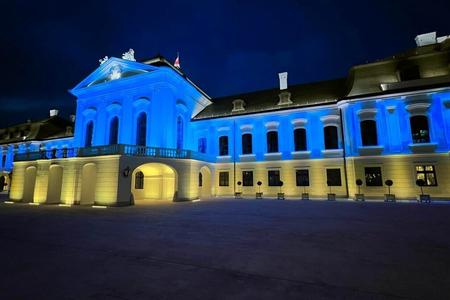
I would like to offer some insight in the form of a few scenes which show how we have reached the point of an imperial war in Ukraine, which shocked all Russians not yet convinced by the propaganda and disinformation campaign that Russia has waged (and continues to do so) for years, while at the same time believing that the refugee crisis will further undermine democracy in Central and Eastern Europe.
Odesa, July 1988 – The Soviet Union
My future wife and I are standing in front of a restaurant in a long queue in today’s Ukrainian, then Soviet, Odesa. After half an hour of waiting, they sit us at a table with six other people and pour us shots of vodka without asking, somehow automatically, even though there is a prohibition.
We are served food on plates – not like the day before at the eatery, when we got chicken and potatoes on a paper tray. My future wife says she will never come to the USSR again and she keeps that promise.
Beer is drunk from street vending machines, where you just wash out and share the same cup, there are long queues for everything, the economy is in shambles and Gorbachev is implementing perestroika, which we all applaud.
The Soviet Union makes trips into space, but really, it’s a backward country.
Moscow, 1991 – The August Coup
Pavel Juraček – my colleague from Smena newspaper – and I are in Moscow, watching an attempted military coup and removal of the first and soon last USSR President Mikhail Gorbachev, who was interned in Crimea. We are right next to the Russian Parliament, which has been surrounded by soldiers.
Shooting is taking place in the streets of Moscow, tens of thousands of people are defending the parliament and Boris Yeltsin, Russia’s President, who has refused to submit to the “putschists” as they are then called.
‘If they attack, we’ll probably die, the Russians will not lose time over some journalists,’ I say. In the end, the coup fails due to the resistance of the civilian population and tens of thousands of Muscovites say goodbye to the victims of the coup in the Vagankovsky cemetery.
For a while, the democratisation process seems to have begun in Russia and while the Soviet Union crumbles, long-standing national wrongs between the Soviet nations spring to the surface. Russia is not mentally ready for the collapse of the Soviet Union. Soon, local wars, in which I myself participated as a journalist, start breaking out. It is then that our hero Gorbachev becomes the anti-hero for Russians, despite the fact that the treaty on the demise of the Soviet Union is mainly initiated by Boris Yeltsin.
The disintegration of the Soviet empire is perceived by the Russians as their defeat and victory of the West. The West. Those are the weird people who accept homosexuality, women’s rights and minorities. In Russia, minority opinion is pushed to the margins of society. For example, homosexuality wasn’t decriminalised in Russia until 1993.
Bendery, Moldova, 1992 – War in Transnistria
“Open the truck and show them the one without the head.” The truck is full of dead people. This is the Transnistria conflict. Similar sights will be seen in all other Russian actions in territories of disobedient states, where a compact Russian minority or a minority that pledges allegiance to Russia lives.
The Russians will take advantage of the civil conflict between the local Russians and the rest of the population. With the support of the Russian army (without direct military involvement – it is enough to send a threat) local governments – dependent on Moscow – will emerge and declare independence.
This is how an independent Abkhazia, Transnistria and South Ossetia come to be, the latter already with direct involvement by the Russian army. Vladimir Putin is already ruling in tandem with Dmitry Medvedev. And it’s Angela Merkel who must stop them so that the Russian army does not reach Tbilisi.
Ordinary Russians applaud Putin, who makes it clear that he will protect Russian citizens wherever they are and that he has a problem with the former Soviet Union countries even considering joining NATO.
In essence, the policy of denying the right of the states of the former Soviet Union to freely decide where they belonged has begun. Russia wants to decide their direction in the name of its own defence doctrine.
Back in 2014, when there is already peace in Transnistria and I am heading for the preliminary round of the Champions League match where Tiraspol are playing, Slovan, the Russian taxi driver, tells me that he would like the Soviet Union to be restored. I ask why. “Because it was our home – no one there shamed us for speaking Russian, no one humiliated us.”
Gagra, Abkhazia, October 1992 – Another war
My colleague Ivan Drábek and I are sleeping on the same floor as the Chechen fighters, who just returned from their victorious campaign against Georgian troops. They are fighting on the side of the Russian-backed separatist Abkhazia.
We are interviewing Shamil Basayev, the leader of Chechen troops. The Russians let them cross the mountain border into Georgia without any problems. During the interview, Basayev lies in bed, his machine gun and assault rifles leaning on the footboard. He says he will protect Muslims anywhere in the world. We are told the same thing a little later by the Cossack ‘ataman’, except about Orthodox Christians.
These are paradoxes that are difficult to understand. Basayev, who fought on the side of the Russians in Abkhazia from 1992 to 1993, will stage terrorist attacks on the Budyonnovsk hospital, the Dubrovka theater and also the Beslan school in the years to come.
Each of these dramas resulted in hundreds of civilian casualties. The war in Chechnya is in full swing, I am no longer there as a journalist. Russia’s Federal Security Service won’t kill Basayev until 2006.
Lviv, 2001 – The two parts of Ukraine
Already as the director of the SME daily, we are negotiating with our partners the purchase of a printer in Lviv. In a restaurant, I want to order in Russian, but the waiter replies in Ukrainian. I have to explain to him that I am not Russian but Slovak and I do not understand Ukrainian well. Only then does he start speaking to me in Russian.
Ukraine has two parts: mostly Russian-speaking in the southeast and purely non-Russian in western Ukraine. Then there is a number of mixed territories.
Moscow, 1990s
We are sitting on the terrace of a luxury restaurant on Arbat Street in Moscow. An elderly lady passing by shouts at us that we are fascist pigs since we can afford to go to such expensive restaurants.
A few years later, the Russians praise Putin for raising their standard of living, Russia is experiencing continuous growth and a reduction of public debt. All this mainly due to rising oil and gas prices.
As my colleague says, the Russians need a strong army to protect their mineral resources – they live off it. They don’t need anything else. Just high oil and gas prices.
Russia, the new millennium
The Tomb of the Unknown Soldier and its eternal flame at the Kremlin wall. A newlywed couple wants to take pictures right by the eternal flame. The groom steps over the chain, but the bride hesitates. ‘Don’t worry, come with me,’ he says to her.
The honour guard warns him to return behind the chain, the groom refuses and disobeys, telling them that he is also a hero, he served in Chechnya. Two more soldiers run out of a nearby booth, kick the young man and arrest him. The woman cries, but everyone around understands that the monument to the unknown soldier cannot be dishonoured by a photograph of newlyweds.
Moscow, 2007 – Hockey championship
A burly guy comes to the VIP lounge, where we stand in line after the first third of the match to get our entry bracelet checked. The man walks right past the whole line. The security guard at the door does not want to let him in, so he headbutts the door, enters and says: “If you stop me one more time, I’ll kill you.” He probably means it.
We – both domestic and foreign guests – are all shocked, but we remain silent. Shell suits are still worn in Moscow. In Slovakia, mobsters had stopped wearing them by then. Cemeteries in Russian cities are full of young men’s graves with tombstones boasting engraved figures of the deceased leaning on their BMW or Mercedes. The Russian music group Dymovaja zavesa (Smoke Screen) released the album Etaži a year before, in which they sing praise to mobsters in one song.
According to many Russians, Putin gradually pacified the mafia. But basically, it was replaced by the state apparatus. Putin’s people controlled both the prosecutor’s office and the courts and, of course, the secret services. Division of power, a characteristic of democratic countries, ceased to exist. Putin gave economic power to “his” oligarchs, made “his” people rich. In return, he demanded total loyalty. He distributes roles among the oligarchs publicly during news programmes broadcast from Ostankino Tower to make ever so clear who is the ruler of the country.
Insurgents like Khodorkovsky and Berezovsky ended up in bad places. The former served ten years in prison, the latter’s life ended in a mysterious suicide in exile in the UK. Those who expected Putin to be as weak a president as Yeltsin were wrong. I am becoming increasingly aware that Russia basically never ceased to be a country of force/power.
2008 – Presidential election
Vladimir Putin doesn’t want to hand over power and exchanges positions with Medvedev so that he can return and rule again. The Parliament then extends the presidency term from four to six years, so Putin has secured the possibility of being in power until 2024. Civilized countries understand how addictive power is, especially in a presidential system, and therefore limit the length of one-man rule. Russians though don’t seem to mind.
They are not bothered by gradually losing independent media, nor are they upset that they have lost Anna Politkovskaya from Nova Gazeta (granted though, her murder did not provoke such massive public opposition as when a similar event happened in Slovakia).
A rumour went around Russia that her death was Chechen President Ramzan Kadyrov’s birthday present to Putin. Putin announced that the aim of the murder on his birthday was to provoke a wave of anti-Russian sentiment in the world.
A similar narrative appeared in the Russian media again after the assassination of the opposition politician Boris Nemtsov seven years later. According to General Markin from the Russian Prosecutor’s Office, it could have been a provocation aimed to destabilise the country.
Two years earlier, former FBS officer Alexander Litvinenko was murdered in London. Later, lawyer Sergei Magnitsky died in custody. Then there were the attempts to assassinate Sergei Skripal and Alexei Navalny.
The regime began brazenly killing its opponents, and we should have understood it then. Many indeed did understand, yet Russians again said to themselves that treason must be paid for, sometimes with the highest price. Meanwhile, Vladimir Putin, smiling at the camera, wriggled out of every charge.
But in the background works the machinery, which transforms public opinion in his favour, opposing voices in discussions are howled out and, above it all, the variety show is king. Pop singers such as Masha Rasputin, Valery Leontiev and Filip Kirkorov pour artistic kitsch into every household. A country, whose people do not stand up for free media, will eventually lose them altogether.
Sochi, 2014 – Olympic games and big sporting events
I’m travelling to the Olympics. Foreign guests say that Russia organised the Winter Olympics excellently. Putin built a magnificent Olympic complex on the shores of the Black Sea in Sochi. The Russians do not understand why foreign media inform their readers that the Olympics have organisational shortcomings.
The constantly negative PR (often, of course, justified) led the Russians, under the pressure of state media campaigns, to stop trusting foreign sources and stop perceiving criticism as relevant. Russia’s friendly face is shown again by the 2018 World Cup organisers through the young volunteers; Diego Maradona comes to Nizhny Novgorod for the match between Argentina and Croatia, and the Russian team even makes it to the quarterfinals.
Many journalists point out that in this way Putin is strengthening his public position and building a cult of personality, while manifesting to Russians that the world accepts them as a great power. In 2021, Putin’s city, St. Petersburg, is one of the cities where EURO 2020 is played. It is my last trip to Russia.
Crimea, 2014 – Annexation shortly after the Olympics
The Russians always felt that the Crimean Peninsula was theirs, vacationing in Yalta, getting intoxicated by the view from the Swallow’s Nest. It was clear that the occupation of Crimea was a violation of international law.
But we somehow unofficially tolerated the idea that Crimea might as well belong to Russia in some way, and if a referendum were held, the Russians, a majority in Crimea, would certainly vote in favour of joining the Russian Federation even without the presence of troops.
If Ukraine ever wants to return the territory, it will most likely be met with resistance from the local population, although the shock that Putin caused by attacking the whole of Ukraine has also changed many people’s leniency towards the annexation of Crimea.
Russia, 2016 – The third sector under pressure
In 2016, Russian television channels launch a campaign against MDIF (today, MDIF is a minority shareholder of the daily SME through the Pluralis investment facility). Unlike former prime minister Robert Fico, they don’t mention the organisation in connection with George Soros. Instead, they claim that MDIF supports opposition media with the aim of disrupting the Russian constitutional system.
The news report contains false information that MDIF gives subsidies to Russian media in US dollars, even though all transfers to Russian media were in reality only loans that Russian publishers had to repay. No one from MDIF gets a word in the report to present their side. The report also claims that opposition journalists get trained all around the world, including Bratislava.
Immediately after, the Russian Attorney General declares MDIF as an undesirable foreign organisation and bans it because it is a threat to state security. MDIF is withdrawing its activities from the country, as well as its Russian management. The organisation advises members of its Board not to travel to Russia due to possible legal conflicts. The fight against another pillar of a democratic society, the non-profit sector, has begun.
A few years later, Maroš Žilinka, the Slovak Prosecutor General, goes to celebrate the 300th anniversary of the Russian Prosecutor General’s Office and signs a cooperation agreement. Let’s just say he doesn’t have very good judgement – to put it mildly.
Ukraine, 2022 – Putin shocks Europe
The attack on Ukraine is an absolute shock to me. I’ve come to understand that Putin was heading toward this the whole time – we just did not realise it – because he considered the West to be weak, unable to fight, without a unifying idea.
Putin gave Russians pride, improved their standard of living, organised the Olympics, football championships, fought terrorists from Chechnya, appropriated Crimea – all of which strengthened his position. Russians finally felt that they had a leader who was not as senile as Brezhnev, weak as Gorbachev, or an alcoholic like Yeltsin. Putin wants to go down in history, he wants to return to the Russians what they think is their former Soviet Union.
Putin’s motivation is purely materialistic. He has everything a worldly man can have – wealth, power, the admiration of most Russians, a young mistress (actually, she is his partner now), although my mother claims that he is divorced only because he has a lot of work and that he is only being slandered by his enemies. And now he wants to restore Greater Russia – ideally within the borders of the Soviet Union.
It is a crazy idea from the last century, as if he did not understand that today’s world is conquered by modern technology and economic success, that market competition is what is supposed to replace hundred-year-old ideas. Putin has the raw materials and the army – he doesn’t need a competitive environment. But he forgot how the Soviet Union turned out with this equipment. It will take a long time for the Russians to understand where this leader has taken them. To the last century.
Russia, 2022 – Public opinion
I asked my mum what she thinks about Putin, and she, an 86-year-old widow who has a Russian TV station on constantly, told me that he did well because the Ukrainians were killing our people and bombing us. That is a pure lie, I say to her.
I write to my relatives in Russia and explain to them that Russian television is deceiving them, that Russia is waging an aggressive war and that Ukraine is defending itself, and that they do not welcome Russian soldiers as liberators and they will suffer many casualties.
Out of politeness, they reply to me, “Hey, Alex, how are you? How is your mum?”. And then they add that the information is ambiguous and there is truth on both sides. They are afraid and at the same time they are influenced by the huge propaganda machinery of Russian television and media.
Sanctions won’t convince Russians either – they are ready to live in poverty, because they have always pretty much lived that way. When I brought a few cans of German beer for lunch to my Russian family in the 1990s, they had a holiday because apparently they never drank such good beer.
The Russians accept the caste system of government and curse it, but essentially they are loyal to it. If someone in the family makes it to “verchushka” (office), they are happy, they don’t need competition, they don’t need Western democracy. They ignore it.
Every additional sanction just confirms to them that the world has united against them. Like with the Olympics; when Russian athletes could not compete under the Russian flag, hardly anyone believed it is because they doped.
Such is the combination of frustration and a great nation that has often been the subject of jokes and criticism since 1991. It will not be easy to get out of this situation, because Putin’s internal opposition will not grow quickly and the few heroes who protest in the squares are immediately arrested and pacified.
It’s hard to explain but Russia felt humiliated and is now proud. It is proud because it is finally taken seriously. In the end though, a lie is always a lie, and I believe that today’s system will eventually begin to fall apart. The question remains though what will replace it. Because Europe doesn’t need Russia as an enemy but as a cooperating partner.
Slovakia, 2022 – Media and lies
I turned on Russian television again for two days. It’s a massacre. According to the state-owned RT, Ukrainians are shelling their own civilians, and someone from the Russian-speaking population readily confirms this.
Ukrainians have blown up a bridge to prevent civilians from leaving the city. Ukrainians use civilians as human shields and deploy combat equipment in civilian houses and the army is positioned on the roofs of apartment buildings where civilians live. But where should they be when they are fighting in the city? The captured Russian army commander is actually a Croatian actor.
Images of burning cities are allegedly from seven years ago. The propaganda machinery is running at full throttle, Europe rejected the Sputnik vaccine, which could have saved millions of lives simply because it is Russian.
The exclusion of Russians from all major sporting events exacerbates the guilt of the great nation and a feeling that the world has united against them. Putin announces compensation for wounded and fallen soldiers. He even stands up for a few seconds to pay tribute to them.
It seems cynical. He keeps repeating the nonsense about denazification of Ukraine. The commentator emphasises that the special operation of the Russian army is not directed against Ukrainian people, but against the descendants of the Banderas (the Ukrainian insurgent army, which fought against the Red Army for Ukraine’s independence during World War II).
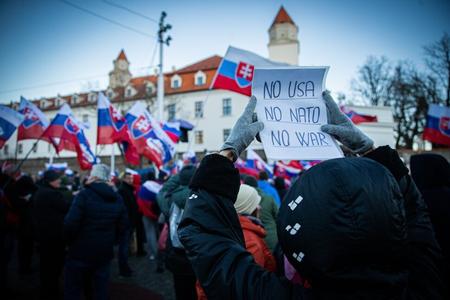
Perhaps it reminds you of something. It’s actually the same recipe but a milder version used by Slovakia’s former prime minister Robert Fico. I’m not writing this because I want to mention him at all costs but to explain how dangerous it is.
A pure lie invoking non-existent dangers almost always results in nationalism. National conflicts referring to some part of history, be it even a thousand years before, destroy people’s lives. A lie politicians spread consciously.
Robert Fico is intelligent enough to know that our newspaper is not owned by Soros and that I am not a “Soros servant”, as he once called me at one of his press conferences.
Over half a century, I have heard many characteristics of me. Once I am a Russian agent, aggressor, occupier. I’ve been called a Hungarian agent by Slovak nationalists even though I don’t speak Hungarian. Most recently, I’m said to be an American or Jewish lackey.
The principle is the same – pointing out that a man does not have decisions in his own hands but is controlled by someone else – a force with dishonest intention. It is a dangerous tool for suppressing society’s instinct for truth.
Nevertheless, Fico ‘justifies’ attacks on the media by saying for example that journalists are prostitutes. Well, they are not. On the contrary, they are one of the barriers to what is happening in Russia.
Most of the theses you hear from Robert Fico were created by opinion polls. Fico does not form a policy for the future in a true sense; rather, he preserves a state of frustration and suspicion. Vladimir Putin has done and keeps on doing the same. We are all shocked that it is possible to make it this far and that people are suddenly dying in a war that is based on pure lies.
Volodymyr Zelenskiyy did not make any of the mistakes made by Georgian President Mikheil Saakashvili in 2008. Zelensky communicated calmly and did not give the Russians any pretext for the invasion. And yet, there they are. This will be an extremely black chapter in Russian history and an expensive levy on contemporary Russian political representation. A levy for the nation’s failed political intuition.
If Putin has achieved anything, it is the unification of Europe in a huge solidarity gesture and realisation that democracy and peace are very far away from being granted.
©Sme
Translated by MDIF.


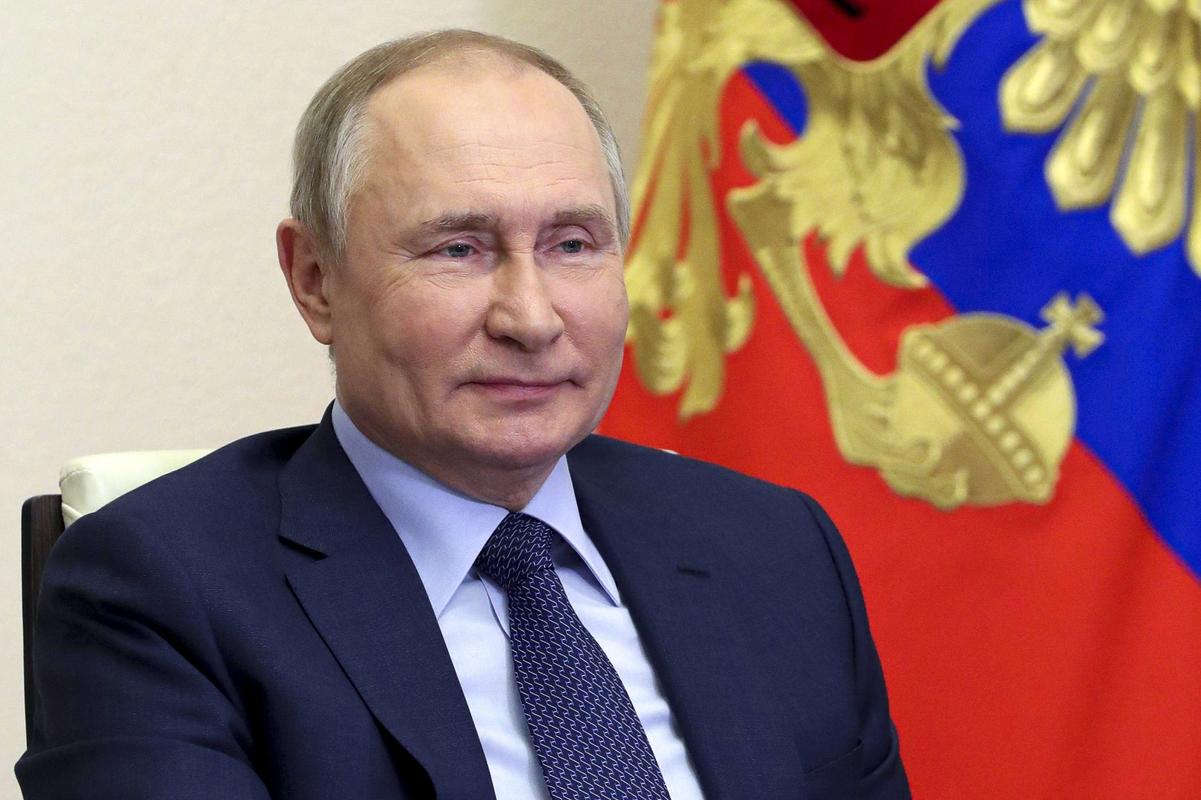 Russian President Vladimir Putin (source: TASR/AP)
Russian President Vladimir Putin (source: TASR/AP)
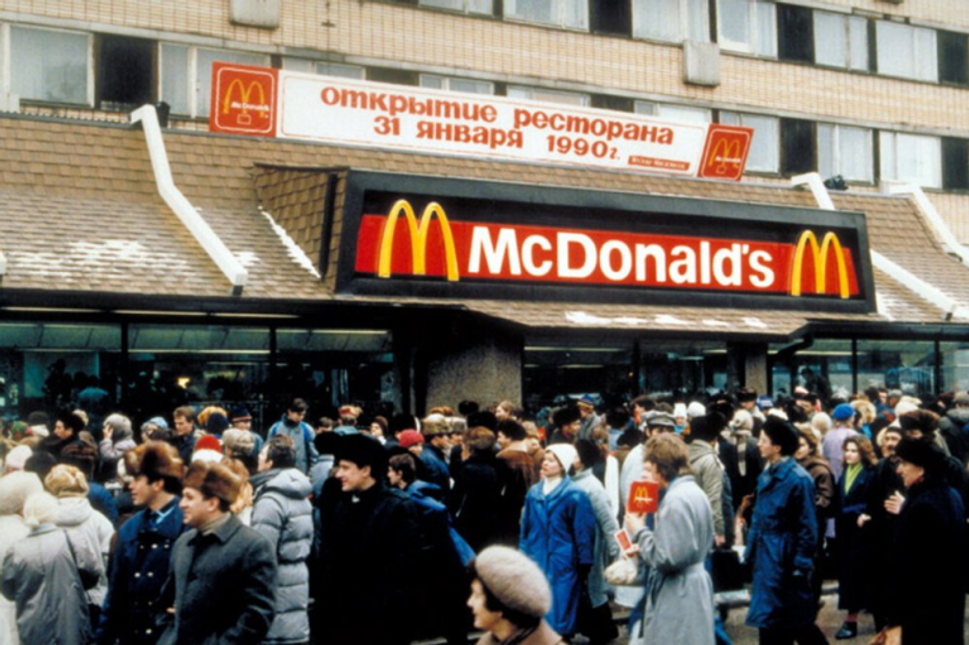 McDonald’s first branch in Moscow in 1990 (source: McDonald’s)
McDonald’s first branch in Moscow in 1990 (source: McDonald’s)
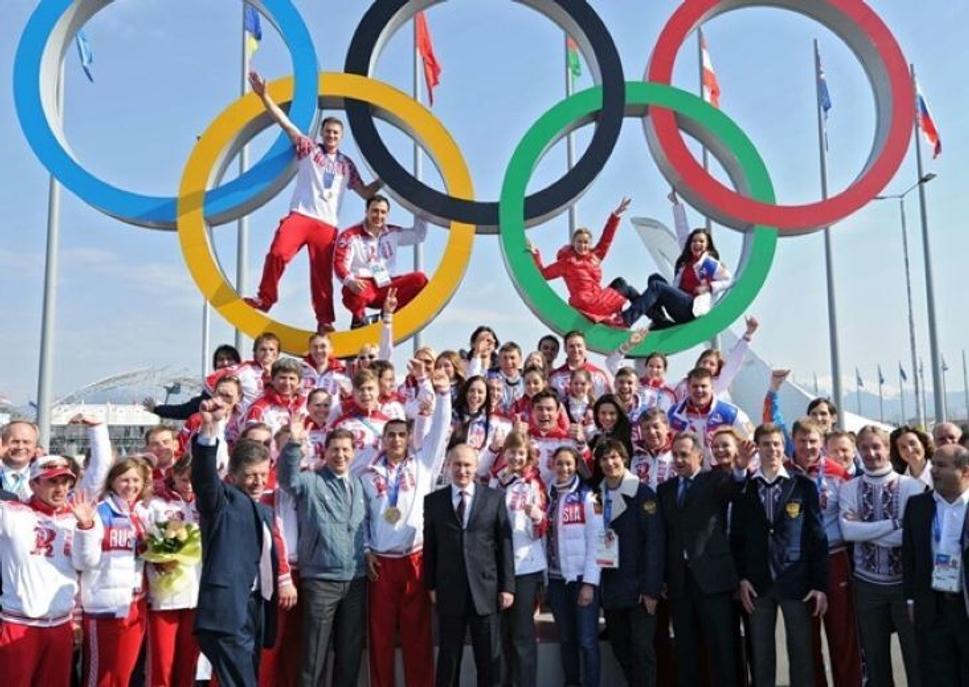 Russian President Vladimir Putin poses with all Russian medalists after the Sochi Games. Six of them have lost their medals to doping so far. (source: SITA/AP)
Russian President Vladimir Putin poses with all Russian medalists after the Sochi Games. Six of them have lost their medals to doping so far. (source: SITA/AP)
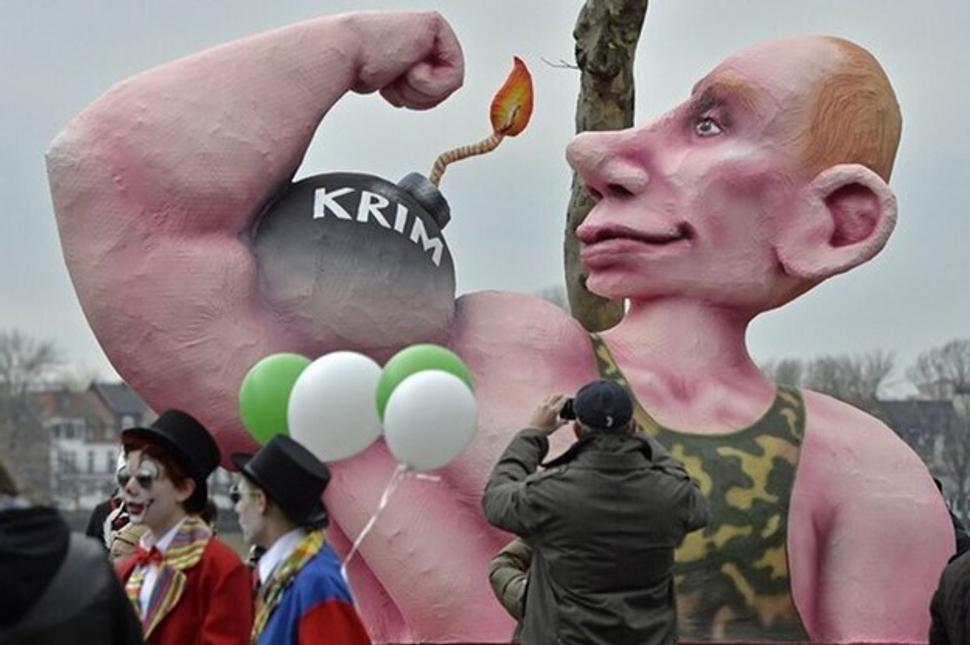 Putin’s attack on Crimea was even noticed at a carnival in Düsseldorf, Germany. (source: SITA/AP)
Putin’s attack on Crimea was even noticed at a carnival in Düsseldorf, Germany. (source: SITA/AP)